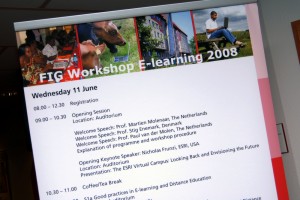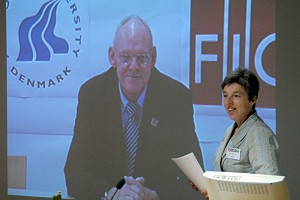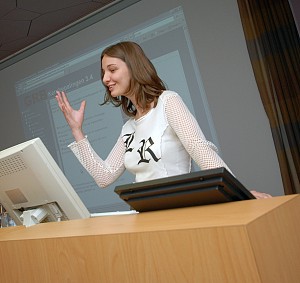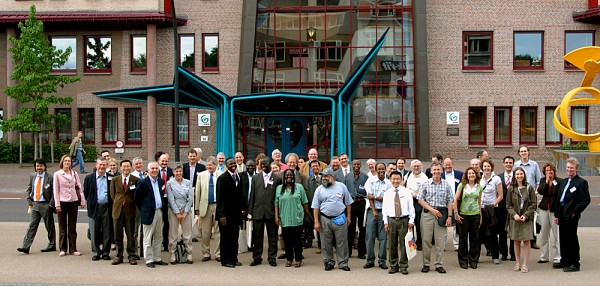FIG International Workshop - Sharing Good Practices:
E-learning in Surveying, Geo-Information Sciences and Land Administration
Sharing Good Practices in E-Learning
ITC, Enschede, The Netherlands, 11-13 June 2008
|

Poster with the programme of the opening session
|
Introduction
From the 11th to 13th of June 2008 a group of international professionals
engaged in e-learning and distance education came together in ITC for the
International Workshop Sharing Good Practices: e-learning in surveying,
geo-information sciences and land administration. The organisation of the
workshop was a combined effort of Commission 2 and Commission 7, and the
International Institute for Geo-information Science and Earth Observation
(ITC) in the Netherlands. The Netherlands Cadastre, Land Registry and
Mapping Agency sponsored the event.
The program consisted of keynote speakers, technical sessions, hands-on
sessions, demonstrations and guided discussions. The organisation received
30 accepted contributions and 70 participants, from 27 different countries,
participated actively in the various workshop sessions.
|

The Workshop Chair invites FIG President Prof.
Stig Enemark
to deliver his opening address through video conferencing from
Denmark. |
Key notes
As first keynote speaker was welcomed Dr. Nicholas Frunzi,
Director of Educational Services, ESRI, USA. Dr. Frunzi gave an overview of
ESRI’s developments in educational services starting with instructor-led
classroom training in 1988 to the ESRI Virtual Classroom today and the
Blended Learning with ESRI Press in the future.
Prof. Bela Markus of the University of West Hungary, Chair of FIG
Commission 2, was the second keynote speaker. After introducing the concept
of e-learning, he discussed the status, the trends and the importance of
business models in e-learning. He stressed the importance a business model
of re-using and sharing resources to build sustainable courses within
networking partnerships.
The keynote addressed by András Osskó, Chief Advisor, Budapest
Land Office and Chair FIG Commission 7, focussed on the importance of
changes in the education of land surveyors. Interest in traditional land
surveying is decreasing, while interest in land administration, on the other
hand, is increasing. Osskó made a plea for lifelong learning which is
necessary not only for individuals but also for institutions to keep the
knowledge of their staff up-to-date.
Technical Sessions
Based on the content of the accepted contributions the following
technical sessions were offered:
- Good practices in e-learning and distance education
- Engaging in e-learning
- Continuous Professional Development
- International Cooperation and/in e-learning
|

Some e-learning professionals active during their presentations (Reinfried
Mansberger, Sven Åke Bjørke, Mathilde Molendijk,
Bela Markus and Nicholas Frunzi) |
During the workshop dinner the Best Paper Award was handed over to Dr.
Henny Mills of Newcastle University, for her paper entitled:
A
Virtual Surveying Field Course for Traversing, written together with David Barber. The paper describes an innovative e-learning tool
developed for a Geomatics degree course. It was considered an excellent
example of how a virtual fieldwork tool can support student understanding
and prepare for real fieldwork.
Hands on sessions
One afternoon of the workshop was reserved for the Hands-on sessions.
Participants could choose from the following 4 different sessions:
- Captivate® for Animations and Simulations
- Creating a Wiki
- Quick and easy lecture video recording
- Communicate. Collaborate. Educate with Elluminate®
The workshop on Captivate attracted the highest number of participants.
The workshops were followed by a demonstration of the e-learning activities
of The Netherlands Cadastre, Land Registry and Mapping Agency.
Discussion Sessions
At the end of each day participants came together in so-called home
groups. These home groups were formed to create an informal platform for
discussion and exchange of experiences and to formulate points for
discussion. Each home group was guided by a moderator.
Conclusions
The conclusions of the four home groups were presented during the Closing
Session and summarised by Chris Paresi, Head of the Department of
Urban and Regional Planning and Geo-information Management at ITC. The
outcome of the discussion can be summarised as follows:
1. The importance of partnerships
Working together, sharing of experiences and resources, is considered of
great importance for the success and further development of e-learning in
the field of surveying, geo-information science and land administration.
The term Thematic Network and the e-learning concept, Community of
Practice, were also proposed in this context.
More in particular were mentioned:
- Explore cooperation between professional organisations FIG, ISPRS
and ICA
- Recognition of e-learning material and courses
- The importance of quality assurance
- The need for a credit exchange system
- The role of open source
- Sharing of Contents
- Stronger partnership between Academia and Professionals
- The need for an e-learning infrastructure
- Promote a business model of re-using and sharing e-learning courses
and courseware
2. E-learning as a tool for Continuous Professional Development
E-learning is considered an excellent tool for continuous professional
development and life long learning, especially in the rapidly changing
working field of the land professional.
More in particular were discussed:
- Nano-units of (e-)learning: small focussed training units, for
particular learning needs
- "Immediate” implementation of learned skills by professionals
- The changing meaning of learning and how to achieve this
- The strong link between e-learning and knowledge management
- Online communication and collaboration tools for exchange of
experiences and mutual learning
- Blended approaches preferred
3. E-learning to engage young surveyors
An issue of concern within FIG is the decreasing interest of university
students in the land surveying profession. Universities and professional
training institutions need to review their education according to new
requirements and students interests. E-learning may contribute to motivate
students to join the profession.
Points mentioned by the groups:
- Online communication and collaboration tools for interaction, group
work, peer exchange, supervision
- Students used to digital learning and communication
- Global interest of students
- Online mentoring and support through Communities of Practice
- Prepare students for Life Long Learning
- An opportunity for students from developing countries
|

Young surveyor
Jennifer van Vooren from the KaHo Sint-Lieven
in Ghent, Belgium, delivering an excellent presentation on a home
study package for land surveyor. |
4. Define the field of e-learning within FIG
The workshop made clear that a lot of knowledge has been accumulated in
recent years in the field of e-learning and surveying, geo-information
sciences and land administration. Many lessons have been learned and it is
the right time now to analyse these lessons and publish the findings.
More in particular it was suggested:
- Prepare a FIG Publication on the topic of e-Learning
- Bring the all experts together in a wiki environment and write a
reference book on e-learning!
5. Some problems and final remark
Many success stories in e-learning were presented during the workshop.
But of course there were also many critical issues to discuss.
Some of the identified shortcomings of e-learning:
- Language a bottleneck
- Cultural differences in learning style and content
- E-learning is a tool and learning is the objective
- For practical teaching e-learning is considered of limited use
- E-learning not really rewarded by training institutions and
universities. Developing e-learning courses and material is demanding in
time and expertise.
Finally
- An award for e-teachers?! They deserve it!
|

Group picture of participants and resource persons in front of the
ITC building. |
More information
Liza Groenendijk
Email:
groenendijk@itc.nl |



























